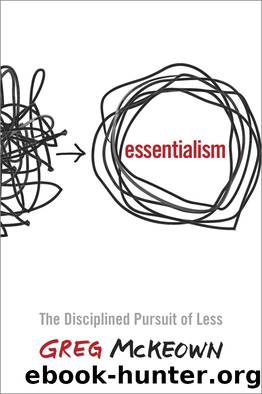Essentialism by Greg McKeown

Author:Greg McKeown [McKeown, Greg]
Language: eng
Format: epub
ISBN: 978-0-8041-3739-3
Publisher: Crown Publishing Group
Published: 2014-04-14T16:00:00+00:00
CHAPTER 12
UNCOMMIT
Win Big by Cutting Your Losses
HALF OF THE TROUBLES OF THIS LIFE CAN BE TRACED TO SAYING YES TOO QUICKLY AND NOT SAYING NO SOON ENOUGH.
—Josh Billings
By any estimation, the Concorde jet was a striking achievement in aeronautical engineering. Aboard this passenger plane you could fly from London to New York in as little as two hours, fifty-two minutes, and fifty-nine seconds.1 That’s less than half the time of a traditional plane, making the Concorde the fastest passenger plane in the world.
Unfortunately, it was also an extraordinary financial failure. Of course many great ideas, innovations, and products are. But what made this one different was that it consistently lost money for more than four decades. Yet each time it went over budget the French and British governments poured more and more money in. They did this even knowing that the chance of recouping their continued investments, let alone the original expenditures, were miniscule; with the plane’s limited seating, few orders coming in, and the high cost of production, it was clear that even with exaggerated estimates the project would never be profitable. Indeed, when the British cabinet papers were released under the thirty-year rule, they revealed that government ministers at the time knew the investment “could not stand on normal economic grounds.”2
Why would intelligent, capable British and French government officials continue to invest in what was clearly a losing proposition for so long? One reason is a very common psychological phenomenon called “sunk-cost bias.”
Sunk-cost bias is the tendency to continue to invest time, money, or energy into something we know is a losing proposition simply because we have already incurred, or sunk, a cost that cannot be recouped. But of course this can easily become a vicious cycle: the more we invest, the more determined we become to see it through and see our investment pay off. The more we invest in something, the harder it is to let go.
The sunk costs for developing and building the Concorde were around $1 billion. Yet the more money the British and French governments poured into it, the harder it was to walk away.3 Individuals are equally vulnerable to sunk-cost bias. It explains why we’ll continue to sit through a terrible movie because we’ve already paid the price of a ticket. It explains why we continue to pour money into a home renovation that never seems to near completion. It explains why we’ll continue to wait for a bus or a subway train that never comes instead of hailing a cab, and it explains why we invest in toxic relationships even when our efforts only make things worse. Examples like this abound; consider the somewhat bizarre story of a man named Henry Gribbohm, who recently spent his entire life savings, $2,600 in total, at a carnival game trying to win an Xbox Kinect. The more he spent, the more determined he became to win. Henry said, “You just get caught up in the whole ‘I’ve got to win my money back,’ but it didn’t turn out that way.
Download
This site does not store any files on its server. We only index and link to content provided by other sites. Please contact the content providers to delete copyright contents if any and email us, we'll remove relevant links or contents immediately.
Your Next Five Moves by Patrick Bet-David(817)
So Good They Can't Ignore You by Cal Newport(744)
The Science of Rapid Skill Acquisition by Peter Hollins(640)
The Ten Equations That Rule the World: And How You Can Use Them Too by David Sumpter(554)
Tableau For Dummies by Molly Monsey & Paul Sochan(546)
Improvise! by Max Dickins(532)
Speaking with Confidence by Nick Gold(529)
The Ten Equations That Rule the World by David Sumpter(527)
Idioms & Phrases by Informative Books(516)
How to Write Anything by Laura Brown(499)
Building a Career in Software by Daniel Heller(490)
Voice-Overs for Podcasting by Elaine A. Clark(470)
The Social Skills Guidebook by Chris MacLeod(469)
How to Decide by Annie Duke(450)
Pomodoro Technique Illustrated: The Easy Way to Do More in Less Time (Pragmatic Life) by Staffan Noteberg(440)
How to Communicate Effectively With Anyone, Anywhere by Dan Bullock(439)
Say Less, Get More by Fotini Iconomopoulos(420)
Copyediting & Proofreading For Dummies by Suzanne Gilad(412)
Perfecting Your Pitch by Ronald M. Shapiro(403)
